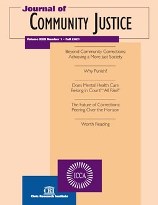Twenty-Year Recidivism Results for MRT-Treated Offenders
Author: Gregory L. Little, Ed.D..; Kenneth D. Robinson, Ed.D..; Katherine D. Burnette, M.S..; E. Stephen Swan, M.Ed..
Source: Volume 19, Number 03, Spring 2010 , pp.15-17(3)

< previous article |return to table of contents
Abstract:
The vast majority of post-treatment recidivism studies are conducted after relatively brief periods, typically ranging from six months to three years after treatment. Long-term recidivism studies in the criminal justice system are rare. However, if a program is truly effective at reducing recidivism, the differences between the treated and nontreated groups should persist over time. The most widely employed and researched cognitive behavioral approach within corrections is Moral Reconation Therapy (MRT®; Little et al., 1999), which is listed in the National Registry of Evidence-Based Programs and Practices (NREPP). More than 120 studies—with timeframes from six months to 10 years—have been published on MRT. A 10-year post-release recidivism study of more than 1,000 offenders treated with MRT during their incarceration showed that reincarceration rates for MRT-treated offenders were 50% compared to 65% for nontreated controls (Little et al., 1999). The present report is a 20-year follow-up on the recidivism rates of the same 1,052 MRT-treated offenders and the almost randomly formed control group of 329 controls reported in prior reports.Keywords:
Affiliations:
1: Advanced Training Associates; 2: Correctional Counseling, Inc. ; 3: Correctional Counseling, Inc. ; 4: Correctional Counseling, Inc. .